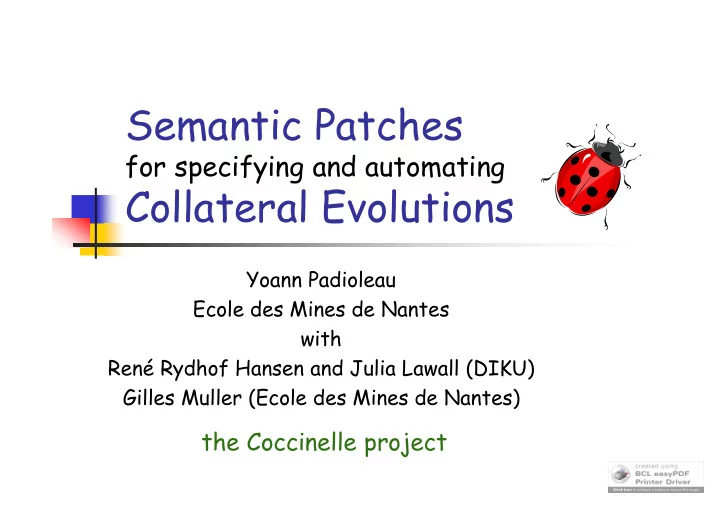

Semantic Patches for specifying and automating Collateral Evolutions Yoann Padioleau Ecole des Mines de Nantes with René Rydhof Hansen and Julia Lawall (DIKU) Gilles Muller (Ecole des Mines de Nantes) the Coccinelle project
The problem: Collateral Evolutions lib.c Evolution int foo(int x ){ becomes in a library int bar(int x ){ Legend: Can entail lots of before after Collateral Evolutions in clients clientn.c client1.c client2.c foo(1 ); foo(foo(2 )); bar(1 ); bar(bar(2)); if(foo(3 )) { foo(2 ); if(bar(3 )) { bar(2 );
Our target: Linux device drivers Many libraries: driver support libraries One per device type, per bus (pci library, sound, …) Many clients: device specific code Drivers make up > 50% of the Linux source code Many evolutions and collateral evolutions 1200 evolutions in 2.6, some affecting 400 files, at over 1000 sites Taxonomy of evolutions : Add argument, split data structure, getter and setter introduction, change protocol sequencing, change return type, add error checking, …
Complex Collateral Evolutions The xxx_info functions should not call the scsi_get and scsi_put library functions to compute a scsi resource. This resource will now be passed directly to those functions via a parameter. From local var to int xxx_info(int x parameter ,scsi *y ) { Delete calls scsi *y; to library ... y = scsi_get(); if(!y) { ... return -1; } ... Delete error scsi_put(y); checking code ... }
Our idea The example How to specify the required int xxx_info(int x program ,scsi *y transformation ? ) { scsi *y; In what ... programming y = scsi_get(); language ? if(!y) { ... return -1; } ... A patch-like scsi_put(y); syntax ? ... }
Our idea: Semantic Patches @@ metavariables function xxx_info; identifier x,y; Declarative @@ language int xxx_info(int x + ,scsi *y ) { - scsi *y; the ‘ ... ’ ... operator - y = scsi_get(); - if(!y) { ... return -1; } ... - scsi_put(y); ... } modifiers
SmPL: Semantic Patch Language A single small semantic patch can modify hundreds of files, at thousands of code sites This is because the features of SmPL make a semantic patch generic by abstracting away the specific details at each code site: Differences in spacing, indentation, and comments Choice of the names given to variables (use of metavariables) Different ways to sequence instructions in C (control-flow oriented rather than AST oriented) Other variations in coding style (use of isomorphisms)
Sequences and the ‘…’ operator C file Semantic patch 1 y = scsi_get(); - y = scsi_get(); 2 if(exp) { ... 3 scsi_put(y); - scsi_put(y); 4 return -1; Control-flow graph of C file 5 } 6 printf(“%d”,y->f); 1 path 1: 7 scsi_put(y); 2 8 return 0; path 2: 6 3 7 “. . .” means for all subsequent paths 4 8 One ‘-’ line can erase multiple lines exit
Isomorphisms Examples: Boolean : X == NULL !X NULL == X Control : if(E) S1 else S2 if(!E) S2 else S1 Pointer : E->field *E.field etc. How to specify isomorphisms ? @@ expression *X; @@ X == NULL <=> !X <=> NULL == X We have reused SmPL syntax
Example C file Semantic patch f(1); f(X); if(exp) g(3); ... else g(4); - g(Y); + g(X,Y); CFG CTL n1 X . f( X ); Æ AX A[true U 9 ] Y .g - ( - Y - ) - ; -+g( X , Y ) v v . 9 9 n2 match Witness tree n3 n4 n5 Formula matches model at node 1 with binding tree: X -> 1 v -> (n3, ) , Y -> 3 g - ( - Y - ) - ; -+g( X , Y ) v -> (n4, ) , Y -> 4 g - ( - Y - ) - ; -+g( X , Y )
Conclusion Collateral Evolution is an important problem, especially in Linux device drivers SmPL: a declarative language to specify collateral evolutions Looks like a patch; fits with Linux programmers’ habits But takes into account the semantics of C (CFG-oriented, isomorphisms), hence the name Semantic Patches A transformation engine to automate collateral evolutions based on model checking technology
Recommend
More recommend